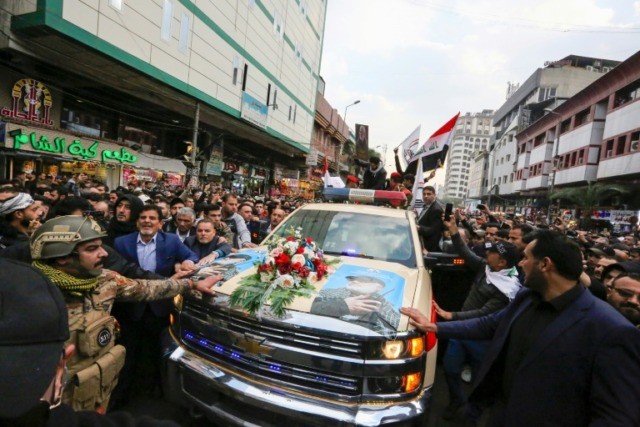Baghdad (AFP) – A deadly US drone strike in Baghdad has rocked America’s ties with allies on the ground, left diplomats scrambling to contain the fallout and Iraqi officials outraged at the airspace violation.
The strike on the outskirts of Baghdad’s airport early Friday killed Iranian General Qasem Soleimani and top Iraqi commander Abu Mahdi al-Muhandis, among others.
The US has hailed it as a win for “peace and stability” in the region, in contrast to Western diplomats and US military officials in Baghdad.
None had received prior warning of the pre-dawn strike and learned of it when they woke up, sending them into crisis talks to salvage ties with Iraqi officials.
“The strike was such a surprise to all of us,” one Western diplomat said, speaking on condition of anonymity.
“Speaking to the Americans now is extremely complex. We’re talking a lot together as the European Union but the Americans have their own problems now,” the diplomat said.
Most ambassadors were still outside Baghdad for end-of-year holidays on the day of the strike, so political staff still in Iraq began a flurry of outreach to Iraqis.
They declined to comment due to the sensitive nature of current ties with Washington but expressed outrage at a statement by US Secretary of State Mike Pompeo.
“Frankly, the Europeans haven’t been as helpful as I wish that they could be,” Pompeo told Fox News hours after the drone strike.
“The Brits, the French, the Germans all need to understand that what we did, what the Americans did, saved lives in Europe as well,” he said.
– ‘Major fissures’ –
Even at the military level, the strike strained ties between the United States and its other partners in the coalition fighting the Islamic State jihadist group.
“As for our Western allies, in the grand scheme of things, it appears we screwed them over,” a top US defence official deployed in Iraq told AFP.
Some 5,200 US soldiers are stationed across Iraqi bases to support local troops preventing a resurgence of IS.
They make up the bulk of the broader coalition including troops from dozens of countries, invited by the Iraqi government in 2014 to help combat the jihadists.
On Sunday, in reaction to the strike, Iraq’s parliament voted in favour of rescinding that invitation and ousting all foreign troops.
The following day, a US general told the Iraqi government troops were preparing to depart “in due deference” to the decision but the Pentagon denied the withdrawal.
It only added to the chaos, with diplomats from coalition countries, saying they had not been looped into the letter to Iraq’s military, which the US said was a “draft”.
The US-led coalition and even NATO had already suspended training and anti-IS operations for security concerns in the wake of the assassination of Soleimani.
A second US military official told AFP the strike had made ties with coalition partners “extremely tense”.
“They would not look us in the eye. Imagine being a part of this team, and one guy decides to strike out on his own,” the second official said.
Daily interactions with Iraqi officials had also become strained, as the strike was roundly condemned by Baghdad as a violation of its sovereignty.
“This has caused major fissures in our relationships with them,” the top defence official said.
An Iraqi security source said it had created a “crisis of trust” between US troops and Iraqi forces. “They’ve largely stopped talking to each other,” the source said.
– ‘Allies under threat’ –
In the days following the strike, rockets have hit the high-security Green Zone, home to a host of embassies, and military bases where coalition forces are stationed.
“Whether intentional or not, the US has put its allies on the ground –- both civilian and military –- under threat,” said Robert Ford of the Middle East Institute.
Ford was a diplomat at the US embassy in Iraq between 2004-2006 and 2008-2010.
He said that Washington’s failure to coordinate with its own military assets on the ground and its allies had “left them holding the bag”.
Donald Trump’s administration “is asking European allies to sign a blank check to support whatever the US does, even though US has not been able to articulate a long-term game plan for Iran,” said Ford.
The behaviour of the White House mirrors the lead-up to the 2003 US-led invasion of Iraq, said Jean-Pierre Filiu, a Middle East specialist and former French diplomat.
Now, as then, the US was “completely blind” to the repercussions of its military actions in Baghdad, he told AFP.
“The most disturbing thing in the American escalation is the absence of any proper Iraqi strategy, which can only destabilise the US’s allies in the anti-jihadist coalition,” he said.

COMMENTS
Please let us know if you're having issues with commenting.